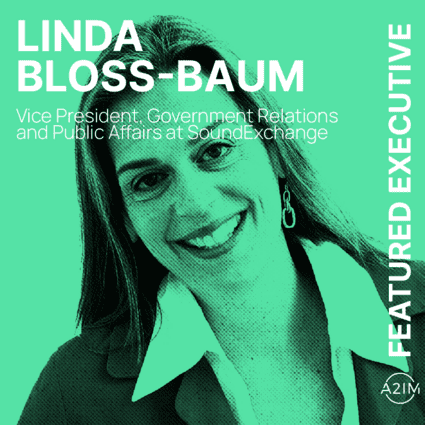(Hypebot) — “I am incredibly optimistic about the future of the music industry as emerging technology continues to revolutionize how and where artists can create content and expands the ways in which they can monetize their craft,” says Linda Bloss-Baum, VP Government Relations and Public Affairs at SoundExchange.
A guest post from A2IM.
She is a music business veteran and policy expert driving an artist-first strategy centered on industry-shaping advocacy efforts in favor of the fair treatment of music creators.
She represents SoundExchange before critical external audiences, including lawmakers, regulators, and key industry stakeholders.

Hey Linda! Can you tell us about how you got your start in the music industry?
After graduating from Catholic University Law School, I served as Telecommunications Counsel to the House Energy and Commerce Committee. In that role, I had the privilege of meeting and working with hundreds of experts from the entertainment, technology, and telecom industries. From there, I joined the ranks of private sector professionals to represent the music industry in the nation’s capital for over 20 years.
I gained further valuable experience heading the Warner Music Group office in Washington, D.C. I also served as Vice President, Public Policy/Government Relations at Universal Music Group/NBC Universal and Time Warner, Inc.
Those roles eventually inspired me to establish my own agency, LBB Creative Strategies, through which I was an independent consultant for SoundExchange and recording artists, before joining SoundExchange full-time in 2014. For eight years, I served as a liaison between SoundExchange, artists, and industry leaders in the role of Senior Director, Artist and Industry Relations. That experience positioned me to effectively bridge the creator and policy worlds in search of answers to music’s most pressing business and policy challenges.
Today, I lead our organization’s public affairs department driving a strategy centered on industry-shaping advocacy efforts. I couldn’t be prouder than when I explain to lawmakers all we are doing and have done at SoundExchange to make the business of music more simple, more efficient, and more fair for creators.
Is there a success story or career milestone?
During my very first month heading up the then new Warner Music Group’s office in Washington, the copyright industry won the landmark MGM v. Grokster Supreme Court ruling. That certainly was an early and important reminder of the critical role Washington governance plays in the entertainment ecosystem.
In my current work, the introduction of and progress surrounding the American Music Fairness Act is a point of great pride. To elevate creators’ voices before policymakers on the issues that affect their lives and livelihoods most is exceedingly rewarding.
Are there any projects that you’re currently working on that you’re most excited about?
The American Music Fairness Act (AMFA) seeks to right the decades-long mistreatment of artists and rights owners as it pertains to terrestrial radio. While the industry has modernized the bulk of the music royalty ecosystem, this one injustice—performers not seeing a dime when their music plays on AM/FM radio–remains. Getting artists and rights holders paid fairly for their work, no matter where it plays, has been a steady plight throughout my career. Changing this outdated and egregious system through thoughtful and lasting legislation is simply the right thing to do.
AMFA was introduced at the steps of the U.S. Capitol in June of 2021 with lawmakers and artists standing shoulder to shoulder in solidarity. Last month, the House Judiciary Committee held a hearing entitled “Respecting Artists with the American Music Fairness Act.” At the hearing, major label stars and independent musicians, alike, spoke out about the importance of AMFA. I am encouraged by the progress that AMFA has made so far this year and look forward to continued progress toward the bill’s ultimate passage. We won’t stop fighting for creators.
Outside of your work in music, do you have any other hobbies/ particular areas of expertise/interest etc.?
In addition to my day job, I proudly serve as an adjunct professor at American University’s KOGOD School of Business (my undergrad alma mater!), teaching a class called Protecting the Creative Class in the Digital Age. I also serve on the Board of Directors for the Gospel Music Association, and I sing in my neighborhood basement band for fun.
Before we end, are there any final words of wisdom you’d like to share with our readers?
I am incredibly optimistic about the future of the music industry as emerging technology continues to revolutionize how and where artists can create content and expands the ways in which they can monetize their craft. I am especially inspired by the young people—in particular, my students–entering the business with a new vision and paving a new path. I encourage them to never stop creating and sharing their ideas. Music’s future is being built by the brightest of minds, and I am grateful to be at SoundExchange, doing my part on the front line of this new era of change.





























